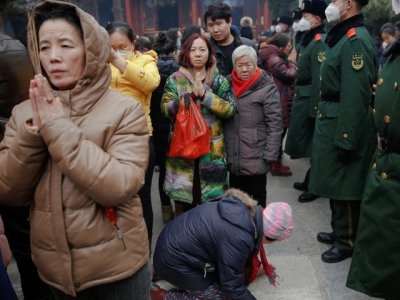
Women pray in front of paramilitary policemen at Yonghegong Lama Temple on the first day of the Lunar New Year of the Rooster in Beijing.
The communists who took the reins in China in 1949 viewed religion as backward and superstitious. Authorities did their best to wipe out religious life. And by the end of the 1970s, they'd been very successful.
The communists who took the reins in China in 1949 viewed religion as backward and superstitious. Authorities did their best to wipe out religious life. And by the end of the 1970s, they'd been very successful.
"There were basically no functioning places of worship in the entire country. This is a place that had over 1 million temples and scores of churches and thousands of mosques," says Ian Johnson, the author of the new book "The Souls of China: The Return of Religion After Mao." "They were all closed down or destroyed."
But these days, Johnson says, religion has not only survived in modern China, it's thriving.
"(Karl) Marx said that religion was the opiate of the masses, and sometimes I think that the (Chinese) government is a little cynical and thinks, 'Yeah maybe it is the opiate of the masses, but for us, now, we'll use it as the opiate to keep the people in line.'"
President Xi Jinping has called on China's citizens to continue to be "unyielding Marxist atheists." He insists that the country's 85 million Communist Party members remain atheists. But increasingly, he's loosening the restrictions on religious organizations. These days, Chinese authorities even subsidize some religious practice under the guise of backing what the government calls "traditional culture."
https://www.usatoday.com/story/news/world/2017/05/03/religion-atheist-china-communism/101238320/
Yet another defeat for militant atheism.
Last edited:





